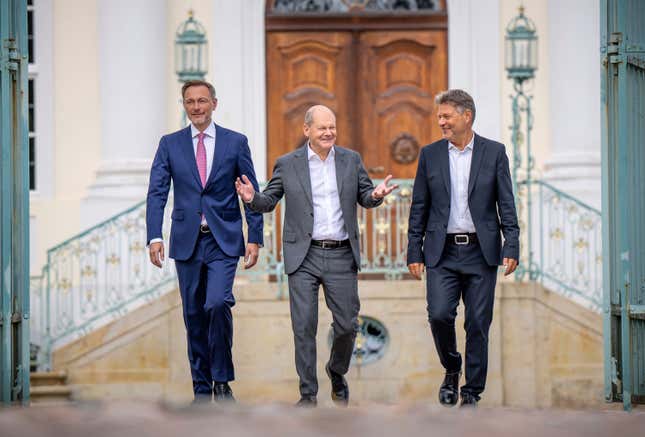
BERLIN (AP) — German Chancellor Olaf Scholz pledged on Wednesday that his government will tone down frequent public infighting that has weighed it down badly in polls as it works to pick up the country's stagnant economy, Europe's biggest.
Scholz spoke after his Cabinet held a two-day retreat outside Berlin, emerging with plans to encourage climate-friendly investments, provide tax relief for companies and cut red tape. The meeting followed months in which the three-party coalition's agenda to modernize Germany has often been overshadowed by internal squabbling.
“We are a government in which hammers and screws are at work, and that leads to noise, as you have noticed — but things come out of it,” Finance Minister Christian Lindner said.
Scholz made clear that he's banking on less noise going forward.
“We will hammer and tap, but with sound absorbers,” the chancellor told reporters. “It shouldn't be heard any more.”
Center-left Social Democrat Scholz leads a coalition of socially liberal parties that took power in late 2021 with a progressive agenda. But their approaches to economic and other issues are often at odds, in particular between his two junior partners: the environmentalist, traditionally left-leaning Greens and the pro-business Free Democrats.
The two squabbled at length earlier this year over a plan to replace fossil-fuel home heating systems.
Two weeks ago, hopes of presenting a more united front after the summer break were dashed when one of the Greens' ministers initially blocked a Cabinet decision on the plan by Lindner, the Free Democrats' leader, for company tax relief. She had been trying to months to get more money for her plan to expand child benefits. On Monday, the coalition reached a compromise on that issue.
Another potential disagreement lies ahead: a call by Vice Chancellor Robert Habeck, the economy minister and a Green party member, for subsidized electricity for big companies. Lindner and the Free Democrats oppose the idea; Scholz's party came out in favor of it this week, but the chancellor himself is skeptical and avoided a clear position Wednesday.
Scholy emphasized efforts to transition to renewable energy, and said he is confident that they ultimately “will be reflected in big growth.” At present, the economy is stuttering.
In the past two weeks, the Cabinet has approved major parts of the coalition’s social reform agenda — plans to ease rules for obtaining German citizenship, liberalize rules on the possession and sale of cannabis, and make it easier for transgender, intersex and nonbinary people to change their gender and name in official registers.
It's unclear whether the government can win back voters. Manfred Guellner, the head of the Forsa polling agency, wrote in a weekly report Wednesday that “the self-described ‘progressive coalition’s' efforts at progress are not understood ... not considered important (such as the ‘cannabis legalization’) or they cause a lot of anxieties (like the ‘heating bill.’)”